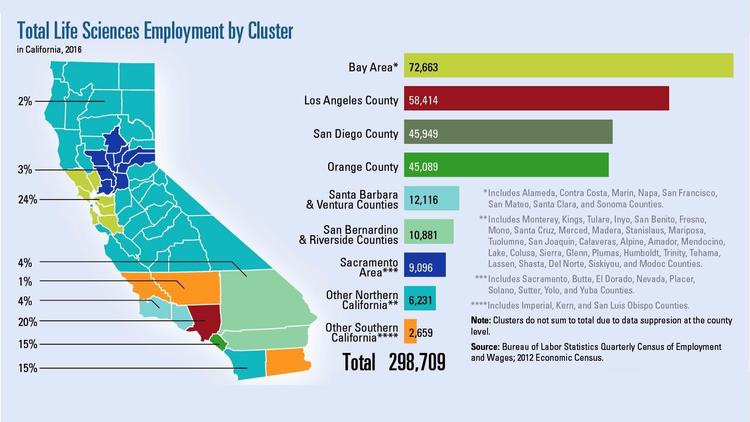mployment in San Diego County’s life sciences industry eclipsed Orange County for the first time, ranking the region No. 3 in the state, says the latest report from the California Life Sciences Association, a public policy trade group.
Employment continued to increase, while wages remained far above average, said the report, issued Wednesday. (It will be available on the life sciences association’s web site at www.califesciencesindustry.com.)
San Diego’s life science employment of 45,959 edged past Orange County, which came in at 45,089.
In 2015, 38,685 were employed in San Diego County, for an annual growth rate of 19 percent.
Moreover, the county’s life science job growth rate surpassed that of the state by a wide margin. California’s life science industry employed 298,709 in 2016. In 2015, the industry employed 287,200, for an annual growth rate of 4 percent.
The San Francisco Bay Area and Los Angeles County remained in first and second place, with respective employment of 72,663 and 58,414. However, San Diego County’s population is far smaller than those areas, and employment is tightly clustered around La Jolla and in Carlsbad.
“San Diego has a thriving medical device industry, and it has a thriving genomics community,” said Sara Radcliffe, president and CEO of the California Life Sciences Association. “Our report shows that trend continues in terms of direct jobs.”
San Diego County’s life science employees earned an average wage of $115,500, the report found. The average wage for all jobs in the county was $56,448, according to the California Employment Development Department.
Much of the money flowing into San Diego County came from research grants, especially from the National Institutes of Health. For the first time, the report tracked NIH funding by congressional district. The 49th District — represented by Rep. Darrell Issa (R-Vista) — came in first, with $722 million awarded.
In total, more than $800 million in NIH grants were awarded in the county.The region is also projected to attract $668 million in life sciences venture funding. San Diego’s growing digital health sector is projected to attract $120 million in venture capital.
The report noted that San Diego’s life science industry is continually renewing itself. As companies get larger, or are sold, their executives constantly form new companies.
Keith Murphy, a CLSA board member and one of those profiled in the report, is an example of this trend. He stepped down earlier this year as CEO of Organovo, a company that “bioprints” living human tissues for research and eventually for therapies.
Radcliffe said Murphy is representative of entrepreneurs who see new technologies emerging and seek to drive them forward. As bioprinting technology has improved, so has its potential applications.
A few months ago, Murphy took up leadership of a new company, Viscient Biosciences.
Viscient has partnered with Organovo to use bioprinted human liver tissue to study liver disease. The goal is to get a better understanding of liver disease than can be found in animal models. Such an understanding would give researchers more guidance in finding better therapies.
This builds on Organovo’s initial product of liver tissue for drug toxicology screening, Murphy said. Liver toxicity is one of the biggest hurdles encountered in developing new drugs.
“That platform has shown itself to be more predictive in terms of predicting liver toxicology, and more recently has shown really powerful models of liver fibrosis,” Murphy said. “What Viscient will do is build off of that in a collaborative way where we’ll be pursuing specific disease models that build on the base that Organovo has.”
The CLSA report is produced in conjunction with PwC US.





